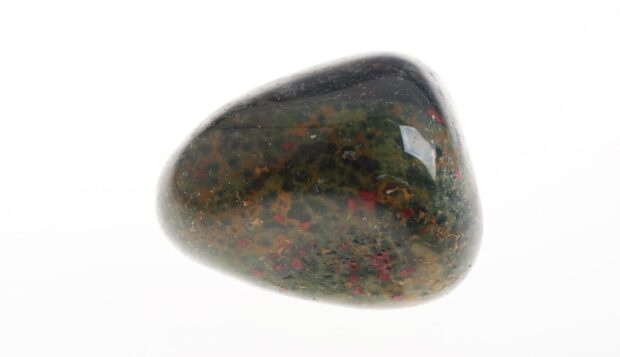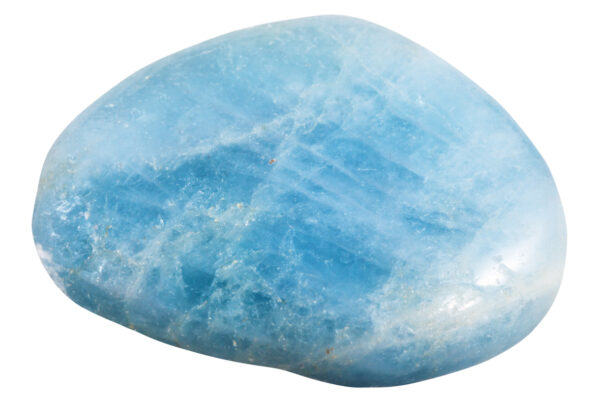As you move from February into March, you might long for a calm and grounding energy as you navigate the muddy, liminal space between winter and spring. The March birthstones—ocean-hued aquamarine and the lesser-known but no less powerful bloodstone—can help propel you into the next season with clarity and conviction.
The gemstones are unique in their own way, and while emotional Pisces and strong-willed Aries can particularly benefit from harnessing the energetic powers of each March birthstone, they prove useful to anyone regardless of their zodiac sign. “They offer support to anyone during the month of March, which bridges Pisces and Aries season,” says multi-modality crystal healer Laura Ellis. “All are affected by the sign of the time period which can make us more ungrounded, emotional, and energetically sensitive.”
Properties of aquamarine, the March birthstone for calm and balance
- Birthstone color: Blue or blue-green
- Element: Water
- Planet: Neptune
- Chakra: Throat chakra
- Origin: Brazil, Pakistan, Zambia, Madagascar, Nigeria, and Mozambique
Aquamarine is a variety of the mineral beryl, and a close relative of striking green emerald (the May birthstone). It is mined in Pakistan, and in several places in Africa, such as Zambia, Madagascar, Nigeria, and Mozambique, but mainly in Brazil.
Birthstone meaning and symbolism of aquamarine
Aquamarine’s name is derived from the Latin words aqua, for “water,” and marina, “the sea.” True to its namesake, the March birthstone’s color comes in shades of blue and blue-green—and, interestingly, much of the lore surrounding the gemstone is related to the ocean.
“It’s very symbolic of the sea and the reflection of the sky and the sea,” says Therapie owner Michelle Roques-O’Neil, a healer who has been working with crystals for more than 20 years. “They were very much used by ancient society like the Egyptians and the Greeks and Romans for protection, strength, and healing, and sometimes for divination.” It’s also been said that Roman sailors used it as protection while at sea and to appease the Roman god Neptune when traveling through rough waters.
Today, the gemstone is known for its calming and balancing properties. It helps “soothe emotion and bring peace,” says Ellis, helping to calm the mind and offer the clarity of crystal-clear waters. According to Roques-O’Neil, this makes it particularly helpful for Pisceans. One of the defining Pisces personality traits is that they often live with one foot in a dreamworld and one foot in reality. “Because they have a tendency to be off with the fairies, what they need is clarity and the ability to step out of that dreamworld,” she says.
This calming stone can also help people cultivate more compassion towards themselves and others, says Roques-O’Neil. Individuals with low self-esteem or who have a tendency to be reactive when they’re emotional can benefit from having it on hand. For those who have trouble letting go, be it of an unhealthy relationship or forces outside your control, aquamarine may also be beneficial. “It connects you with your inner wisdom,” she says—which might be what’s needed to release what no longer serves you.
In addition, aquamarine is closely connected with the throat chakra, helping people communicate clearly and spread their truth. As Heather Askinosie, co-founder of Energy Muse, previously told Well+Good: “This crystal helps you stay present and be flexible when communicating with others. Rather than getting fixed or attached to how a conversation should go, aquamarine washes any stress or tension from your mind and helps you to go with the flow.” Roques-O’Neil adds: “It encourages a quiet calm, so that you can access your own inner wisdom and communicate that without fear.”
There are many ways to call upon the calming and balancing powers of aquamarine. You can wear it as jewelry, says Roques-O’Neil, or you could put it in a pouch and wear it close to your heart to offer emotional support. She also turns to aquamarine whenever she needs to communicate clearly and keeps in her hand to help keep communication channels open and speak with confidence.
Properties of bloodstone, the grounding and protective March birthstone

- Birthstone color: Dark green with red or orange flecks
- Element: Fire and wood
- Planet: Mars
- Chakra: Base, sacral, and solar plexus chakras
- Origin:India, Brazil, and Australia
Bloodstone or heliotrope, the second March birthstone, is an opaque chalcedony, which is a variety of quartz. It’s typically dark green in color with red or orange flecks that occur because of the presence of iron oxide. According to the American Gem Society, the stone is mainly sourced from India, Brazil, and Australia.
The birthstone meaning and symbolism of bloodstone
In the past, bloodstone was often referred to by its other name, heliotrope, which is derived from the Greek words, helio and tropos, translating to “sun-turning.” The name was inspired by the belief that its color transformed from green to blood red at sunset.
While it isn’t as widely recognized as aquamarine, ancient civilizations believed bloodstone was a magic stone imbued with protective powers. “They attributed it with invincibility,” says Roques-O’Neil. “They even believed that it could influence the weather.” As it was considered a crystal for protection, it was used to adorn amulets and shields to ward off negativity.
Bloodstone isn’t just regarded as a protective stone—it’s also a powerful energizer. According to Roques-O’Neil: “It helps encourage physical vigor and vitality” and “it promotes confidence and courage.” This makes it a helpful companion when the going gets tough, so to speak. What’s more, it can strengthen your intuition while quelling any worries of whether you’re moving ahead in the right direction. It’s for these same reasons that bloodstone can be useful for strong-willed and fiery Aries. “It helps temper worries and offers emotional strength, which I think Aries often need,” says Roques-O’Neil. Although key Aries personality traits are strength and fearlessness, “they are actually quite sensitive,” she says.
This stone is also known for its clarifying properties. It clears stagnant energy that causes mental and emotional blockages that often muddle perspective while helping you visualize a path forward. Much like aquamarine, it encourages you release what’s holding you back, allows you to channel energy productively, and keeps you grounded, so you can progress with intention, rather than charging forward with abandon.
Roques-O’Neil adds that bloodstone has close connections to three chakras—namely, the base, sacral, and solar plexus chakras, which are collectively known as the lower chakras. These chakras represent the relationship to the physical world, and earthly matters such as survival, pleasure, and power. Bloodstone’s grounding properties help ensure they stay in alignment.
To harness the protective and cleansing properties of this March birthstone, you can opt to carry it around in a pouch or purse, or place it in your home. When you meditate, you can hold bloodstone in your palm, which can help you manifest your aspirations. You can also, of course, wear it as jewelry, says Roques-O’Neil, whether for courage or as a motivating force when you are stuck.
What are birthstones?
Birthstones are gemstones that represent a person’s birth month or zodiac sign. Their origins are believed to trace back to biblical times, and the first-century historian Flavius Josephus associated the 12 gemstones on Aaron’s breastplate in the Book of Exodus with the months of the year and the 12 zodiac signs. However, the custom of wearing an individual gem per month didn’t begin until around the 15th or 16th century in Germany or Poland. Birthstones are also found to have origins in Eastern Culture. The Ratna Pariksha, a fifth-century Hindu text, linked specific gems to deities, celestial bodies, and days of the week, while Vedic astrologers recommend certain gems to individuals based on their astrological birth chart.
In 1912, the American Council Association of Jewelers (which is currently known as the Jewelers of America) created a standardized list of birthstones in the United States. This list was updated by the Jewelry Industry Council of America and later by The American Gem Trade Association to include new types of birthstones for certain months of the year.
An overview of the birthstones for every month of the year
Want to pick a crystal that corresponds to your birth month? Here’s a quick overview of the birthstones for every month of the year:
- January Birthstone: Garnet
- February Birthstone: Amethyst
- March Birthstone: Aquamarine and Bloodstone
- April Birthstone: Diamond
- May Birthstone: Emerald
- June Birthstone: Pearl, Alexandrite, and Moonstone
- July Birthstone: Ruby
- August Birthstone: Peridot, Spinel, and Sardonyx
- September Birthstone: Sapphire
- October Birthstone: Opal and Tourmaline
- November Birthstone: Topaz and Citrine
- December Birthstone: Tanzanite, Turquoise, and Zircon
Frequently asked questions about March birthstones
What are the two birthstones of March?
The two birthstones of March are calming and balancing aquamarine, and bloodstone, a gemstone with protective and grounding properties.
What is the birthstone of Pisces?
There are three birthstones commonly associated with Pisceans. The first is the purple-hued amethyst, which is considered one of many crystals for healing, and the official birthstone for the month of February. The second and third crystals that have a special connection to Pisces are aquamarine and bloodstone, but of the two, aquamarine is more reflective of the star sign’s watery nature.









